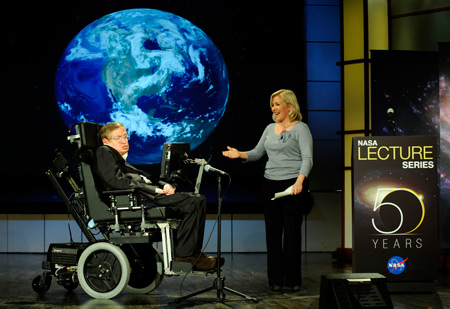Stephen Hawking; the world's finest mind
Stephen Hawking died in 2018. The British
physicist , subject of the
award-winning 2014 movie The
Theory of Everything, lived on and worked on until 2018 at
the University of Cambridge, where he spent most of his
life. This text is updated from a
portrait of Stephen Hawking first published by Linguapress a few years
before his death.
 Stephen
Hawking at the 50th anniversary of NASA in 2008
Stephen
Hawking at the 50th anniversary of NASA in 2008 Many people would agree with the producers of The Simpsons that Hawking, one of the most eminent scientists in the world, had indeed the most brilliant mind of any living person at the time; yet it was a bitter irony that such a brilliant mind should be housed in a visibly disabled body.
There are a lot of people who would very much like to know how Hawking could manage to be such a great scientist, while being incapacitated by "motor neurone disease", which not only left him confined to a wheelchair, but also meant that he could not speak without the aid of a voice-synthesizing computer. Though it was a question that no interviewer ever dared to ask Professor Hawking, his answer can be imagined; clearly, there is no necessary correlation between the two.
"My body may be stuck in a chair," he once said, "But my mind can go to the ends of the universe."
Stephen was born in Oxford, the son of a specialist in tropical medicine, and naturally perhaps, given the circumstances, he became interested in science at a very young age. By the time he was 15, he had decided to become a physicist, because physics, as he said, was the most fundamental of the sciences.
After three years at Oxford University, when, as he himself admitted, he did not work very hard, Hawking got a first class degree in natural sciences; he then moved on to do postgraduate study in cosmology at the university of Cambridge. He seemed to be destined to a brilliant future.
However it was at this point that doctors diagnosed Stephen as suffering from motor neurone disease, a crippling illness that usually leads rapidly to death. Doctors could see no reason why he would be any different from other sufferers, and he was told that he had little hope of living beyond the age of 25; it looked as if the finest mind of his generation was about to be snuffed out.
This was not to be the case. In 2015, at the age of seventy-three, Hawking was still working at the University of Cambridge - living proof, is such were needed, of the power of mind over matter.
Against all the odds, Hawking completed his doctorate at Cambridge, then went on to a research post, firstly in the Institute of Astronomy, and then in the Department of Applied Mathematics and Theoretical Physics.
In 1974, at the age of 32, he had the great honour of being made a fellow of the Royal Society, Britain's oldest and most prestigious scientific association whose past presidents have included Newton, Lister and many other great names. When Hawking was inducted into the Society, the centuries-old induction ceremony, whereby new members come on stage to sign the historic ledger, was changed for the first time. In Hawking's case, it was the president of the Society, Sir Alan Hodgkin, who brought the ledger to him.
As well as the prestige of being a Fellow of the Royal Society, Hawking won a whole string of international prizes, including the Albert Einstein Award in 1978, and received honorary doctorates from 12 universities.
Even though he was frequently referred to as the cleverest man on earth, in spite of his high profile, he was a man who was very much in touch with ordinary people. At Cambridge university, his professorship did not require him to teach classes or supervise students - but he insisted on doing both. And students who had the great fortune to study under him knew that they had a professor who could communicate on their level.
As well as being a professor, Hawking was also a best-selling author, whose "Brief History of Time", written in 1988, is probably the most widely-read scientific book of all time. In it he managed to put over his thoughts about such esoteric concepts as time, gravity, relativity and the origin of the universe, in a style and a language that any educated person could understand.
Besides making a guest appearance in an episode of the Simpsons, Hawking also played himself in Episode 252 (Descent) of Star Trek; the Next Generation, a series of which he is - perhaps rather naturally - a great fan! The episode showed him playing a game of poker in the Holodeck, with Data, Einstein and Newton.
Apart from that, Hawking enjoyed Formula One racing, classical music and also pop - a clear sign perhaps that great minds are not people with narrow interests. Perhaps that's why Hawking chose the universe as his field of study.
WORDS:
correlation: relationship - crippling: disabling, incapacitating - degree: university diploma - disabled : physically handicapped - eminent: highly respected - fellow: member - inducted: received, welcomed - ledger: book of names, of official records - mind : brain - postgraduate: higher level - string: collection, succession - whereby: in which, by which.
Updated from an article originally published in Spectrum magazine, © Linguapress renewed 2025
Discover
an ► IELTS reading
practice test to accompany this text in the new Linguapress paperback
Reading
Practice for IELTS and TOEFL, published January
2025.
WORKSHEET
Phrases:
Explain the following expressions in your own words:
snuffed
out
the power of mind over matter
Against all the odds
In touch with
the power of mind over matter
Against all the odds
In touch with
Missing endings exercise :► jump to this interactive gap-fill exercise
© linguapress.com



 Copyright
information.
Copyright
information.